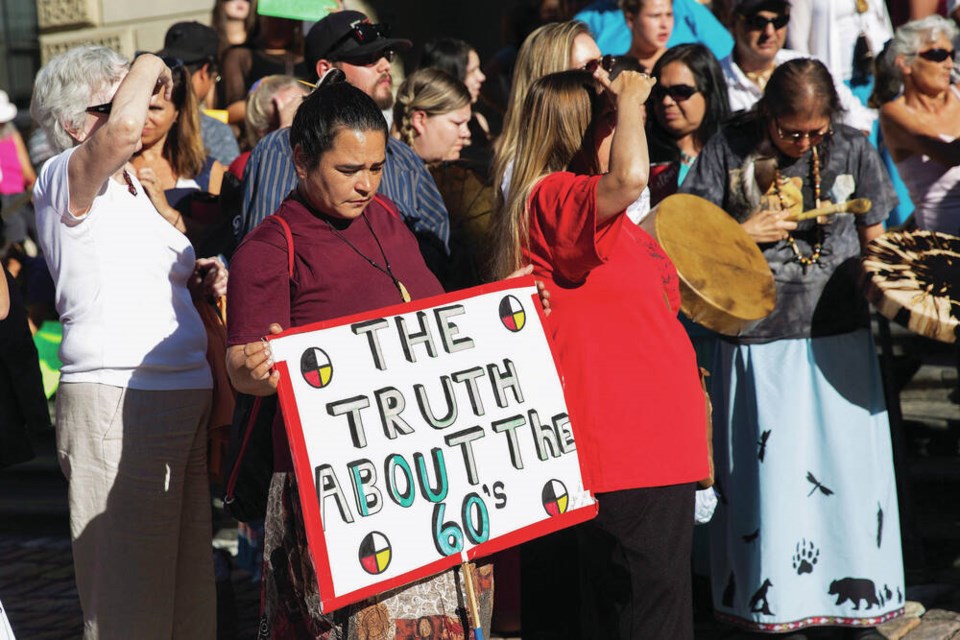In the last two weeks, I have become very close to finally learning who my birth father was. Like my biological mother, he was 50 per cent Indigenous

The term “Pretendian” is becoming a regular word in our society.
It’s a term used to describe someone who is claiming Indigenous ancestry, rights and recognition, and who is being called out for false claims or unprovable claims.
I know there have been many people “outed” as “pretendians” and it has caused outrage in Indigenous communities, both on- and off-reserve.
I’ve written about this before and the impact the issue has on me. I am fully aware that people are falsely claiming Indigenous identity for professional, academic or personal benefit, which is appalling, unjust and ignorant.
It also affects the dignity and credibility of Indigenous people who have lost their identity through colonial impacts.
It’s common knowledge among readers of my column that I was adopted as part of the Sixties Scoop, where thousands of Indigenous children from the 1960s to the 1980s were either adopted or fostered by non-Indigenous families.
In my case, my adoptive family was asked if they would take in an “Indian baby.” They were called on my birthday and picked me up four days later.
My adoptive family was never told what Indigenous community I was from. I grew up not knowing, a struggle I have lived with my entire life.
Even in years when I would not publicly share I was Indigenous, in my heart it was something that I always felt deeply about. It was the only thing I ever really knew about myself and my lineage.
I took a DNA test a few years ago. Weeks later, when I received an email notifying me of the results, I was terrified of the thought that the only truth I’ve ever carried might not actually be true.
I opened the email and learned I was 50 per cent Indigenous. I shared this in a column about a year ago and a couple of readers wrote me saying that if I was “only 50 per cent,” I shouldn’t be identifying as Indigenous and I was deceiving the public. These letters were not sent by Indigenous people.
In the years since the DNA test, I have learned more about where I am from. My birth mother was also part of the Sixties Scoop, born in Fort Chipewyan in northern Alberta and about 50 per cent Indigenous, according to the maternal DNA info I received.
In the past two weeks, I have become very close to finally learning who my birth father was.
I am fairly certain he was never even told of my existence. According to paternal DNA info, he is also 50 per cent Indigenous.
I have spent the past couple of weeks immersed in learning about his community and lineage, language, history and family tree. I don’t have full confirmation, but it’s been narrowed down to a set of brothers.
This has been a momentous moment in my life.
Even if I am never able to meet either of my birth parents, I have been able to answer the question: “Where do I come from?”
In my heart, my Indigeneity is the one thing that has always been there for me and something I am immensely proud of.
I firmly believe my ancestors are walking with me.
I have been able to take that pride in my heritage and incorporate the experience of being raised in a non-Indigenous home and create a career in communications building bridges.
In this column, I often share Indigenous experiences and values for a non-Indigenous audience. It’s something that has helped me find healing and meaning.
I have never been called a “pretendian” and I know I am not one.
Each time a story comes to light of someone falsifying their ancestry, it makes me worry that one day, people will try to discredit me because finding “pretendians” has become a trendy mission.
Again, there are people who falsely claim Indigenous identify, there is no denying that.
I share this deeply personal story to highlight that there are also
many Indigenous people who, like me, because of colonization and
assimilation, were never provided information about where they are from
and where they belong.






















No comments:
Post a Comment
Please: Share your reaction, your thoughts, and your opinions. Be passionate, be unapologetic. Offensive remarks will not be published. We are getting more and more spam. Comments will be monitored.
Use the comment form at the bottom of this website which is private and sent direct to Trace.